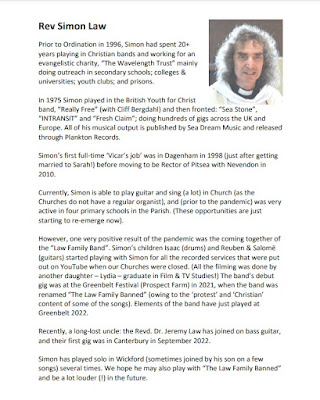Gwynneth Holt and
Thomas Bayliss Huxley-Jones met at Wolverhampton College of Art. They married in 1934 and in 1938 Huxley-Jones became Head of the Sculpture Department at the Aberdeen College of Art.
Joan Weedon writes that: “From that time they both exhibited at the London, Scottish and West of England academies, the Society of Portrait Sculptors and the Paris Salon. Among the awards Gwynneth won were the Feodora Gleichen award (for 'outstanding work by a woman sculptor') for her 'Mother and Child' exhibited at the Royal Academy, and two at the Paris Salon for 'Arts Decoratif and for sculpture. A set of her wartime figurines of a semi-humorous character [‘
Our Gang’], which were cast by the Bovey Tracey pottery, is now in the Imperial War Museum. While living in Aberdeen she also exhibited work in ivories, woods, copper, terracotta and bronze in London and Edinburgh.
[They] moved to Broomfield, Chelmsford, in 1949 where they shared a large studio in their garden and both achieved high personal success. Huxley-Jones's brilliant, imaginative figures gained him wide recognition, and he undoubtedly influenced Gwynneth's own style, although her life studies at that time may be perceived as more naturalistic that the style of her husband's large symbolic works.”
The
blue plaque information from Chelmsford City Council notes that Huxley-Jones “worked as a lecturer, as well as having publicly-commissioned sculptures such as the statue of
Helios at BBC Television Centre and the
Mother and Child statue within the Central Park Memorial Garden in Chelmsford.” Weedon continues: “One of Huxley-Jones's commissions was the
Fountain of Joy, to be seen near Speakers' Corner in Hyde Park. Shortly after his death in 1968, the large figure of the west wind was stolen from the fountain. Gwynneth, a very petite person, undertook the strenuous job of copying and replacing the figure to her husband's original design so that, today, the fountain is complete and appears unaltered.”
The work of Huxley-Jones features at several churches within the
Diocese of Chelmsford. His Woman of Samaria is a fibreglass figure at St Peter's Aldborough Hatch, while at Chelmsford Cathedral, his work includes a
Christus in St Cedd's Chapel, a carving of
St Peter on the south-east corner of the South Transept and 16 stone carvings representing the history and concerns of Essex, Chelmsford, and the Church. In 1968, a 10-foot high Christ figure was designed by the artist for
St Martin of Tours in Basildon. The sculpture was completed in fibreglass at his studio in Broomfield. It was to be his last completed work as a short time later he was admitted to St. John's Hospital in Chelmsford where he died on 10th December 1968. The fibreglass figure is of our Lord pierced by shafts of light with his hands outstretched towards the town in service of the people. It is an invitation of welcome to all to enter.
“Holt completed many works with a
religious theme, or for
ecclesiastical buildings, such as
His Holiness Pope John XXIII,
Hands,
The Resurrection and
Mother and Child. She completed commissions for the 1962 pulpit of St. Andrew’s Church in Hornchurch, Essex; the chapel of the East Mission in Stepney and the limewood The Immaculate Conception for the Church of the Immaculate Conception in Chelmsford.
It was for her work in ivory, however, that Holt was most celebrated as a sculptor, and her ivory sculpture
Annunciation (1946) received particular praise for her carving skills.
Annunciation depicts the Virgin Mary, her palms raised to God, with Gabriel depicted beneath her feet. In 1948, Holt was awarded the Feodora Gleichen award for 'outstanding work by a woman sculptor' for her ivory statuette Mother and Child, exhibited at the Royal Academy of Arts. In the 1972 book Modern Ivory Carving, Holt was described as ‘Britain’s foremost ivory carver’.”
Weedon also notes that: “The demonstrable piety of many of Gwynneth's exhibits created a demand for interpretations of Christian figures and symbols. Eight churches in and around Essex contain her important representations of such figures, and there are other such works traceable to her 'Chelmsford phase'. The Parish Magazine of Stock Harvard (May 1955) contains the following comment about the figure of Christ on the rood beam at All Saints Church: "The figure speaks to us of eternal wisdom combined with eternal youth, and there is about the whole figure and its expression a strength and calmness which communicates itself to people who look at it long enough with a really open mind ... The figure has that strange factor of timelessness which some of the medieval artists secured." …
Examples of her work may be seen in the Church of the Immaculate Conception, Chelmsford; Stock Harvard Parish Church, Essex; Balsham Parish Church, Cambs; St Andrew's, Hornchurch, Essex: Downham Church, Essex; Methodist East End Mission, London; Navestock Church, Essex; Buxhall Church, Suffolk; St Leonard's Parish Church, Eynsham.”
The blue plaque information from Chelmsford City Council records that “In 1952, Holt was elected as a fellow of the Royal Society of British Sculptors. She also produced works in the United States when she visited the Hopkins Centre at Dartmouth College in New Hampshire in both 1963 and 1968. Holt was also known to be one of the Royal Society of Sculptors earliest female members, where she expressed frustration at the sculpture profession being dominated by men. Following her death, Holt’s work has been showcased in many places by both the Royal Society of Sculptors and Chelmsford Museum.”
The graves of both Huxley-Jones and Holt are to be found in
St. Mary’s churchyard at Broomfield.
From 1930–1957 the Reverend Rutherford was vicar of Broomfield, the village near Chelmsford where Holt and Huxley-Jones lived from c.1949 until the death of Huxley-Jones in 1968. Their
bust of Revd Rutherford is now in the collection of Chelmsford Museum.
The daughter of Revd Rutherford,
Rosemary Rutherford, studied art in Chelmsford and at the Slade in London in 1930s. She also trained in the art of true fresco. She was a VAD (Voluntary Aid Detachment) Red Cross nurse during the second world war and created a large portfolio of sketches and paintings of all she observed in hospitals, both at home and in Sri Lanka.
She learnt stained glass making and created 40 windows, including four in Broomfield parish church to replace those shattered by bombing. She attended the East Anglian School of Painting and Drawing at Benton End run by Cedric Morris where she painted flowers and landscapes. Her paintings have gained renewed interest, not least because she was one of only a few women war artists.
Rosemary Rutherford was deeply religious and her spirituality guided her artworks. Her fresco at Broomfield church shows
Christ Stilling the Storm and was surely intended to give people hope during the frightening turmoil of wartime.
She is perhaps most widely known for her stained glass windows, mostly in churches, throughout East Anglia and further afield from Yorkshire to Sussex and even in New Zealand. Her love of bright, bold colours is evident both in the east window of Broomfield church, in her earlier figurative designs and in the more abstract compositions at Boxford and in windows made posthumously to her designs at Hinderclay in Suffolk. Her windows in Essex can seen at: Bradfield St Lawrence; Broomfield St Mary’; Clacton on Sea St Paul; Halstead RC church; Nevendon St Peter; and Tendring St Edmund.
To bring the life and works of this remarkable but largely forgotten artist to the attention of the wider community, a permanent
exhibition was opened in 2023. This exhibition summarises Rosemary’s life and extraordinary artistic achievements.
The second half of the twentieth century saw a large number of significant artworks (often ecclesiastical) commissioned from these important artists based in Broomfield, where they are all also buried. In addition to the exhibition on Rosemary Rutherford at St Mary’s Broomfield and the
blue plaques honouring their memory (also in Broomfield), it would surely also be possible to create an art trail around the Diocese of Chelmsford highlighting their contribution to the churches of the Diocese.
-----------------------------------------------------------------------------------------------------









































